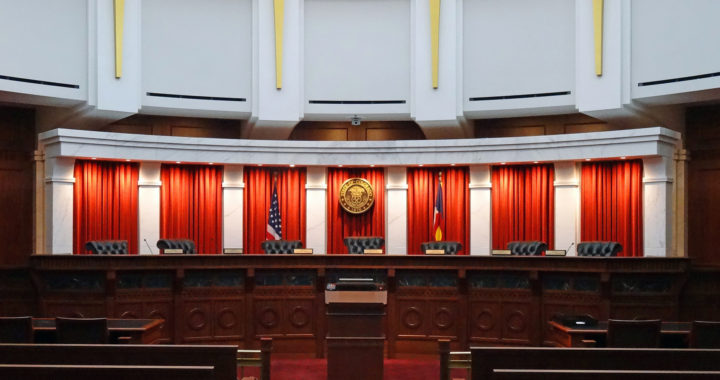Not to be put down after their defeat in last November’s elections, anti-energy activists in Colorado wasted no time orchestrating another round of legislation aimed at restricting the state’s thriving oil and gas industry.
Continue readingTag Archives: Colorado oil and gas
Colorado Supreme Court Decision Ends the So-Called ‘Children’s Crusade’
Just like to tragic historical happening for which it was named, the modern day “Children’s Crusade,” as it was dubbed, has concluded in defeat. Frankly, it’s about time.
Martinez v. COGCC
For those unacquainted with the long-running battle, the COGCC has been under attack since 2013, when Xiuhtezcatl Martinez filed a petition with the Colorado Oil and Gas Conservation Commission (or COGCC) that demanded the regulatory agency suspend all new projects until they could prove conclusively that oil and gas development was not harmful to the environment. For nearly six years, the national oil and gas industry has been threatened by anti-fracking activists whose primary selling point is that they’re too young to go into a bar.
Sure, on the surface, that sounds like a noble quest. The fact that Martinez was a kid also made for stylish headlines, as well. Regardless of the long-running debate surrounding it, Martinez’s petition never amounted to more than a poorly-executed ploy designed to shame one of the hardest working regulatory bodies in the country.
Building an Industry While Handcuffed
In the ruling, Justice Richard L. Gabriel pointed out that the primary role of the COGCC is to “foster the development” of Colorado oil and gas. Ceding economic growth to niche environmental concerns comes a clearly defined second. Even then, the COGCC mandate states that addressing environmental concerns should come, “only after taking into consideration cost-effectiveness and technical feasibility.”
Meanwhile, the COGCC finds themselves operating under regulations that are both wildly restrictive and self-imposed.
In a statement from President & CEO of the Colorado Oil & Gas Association Dan Haley, the exec wrote, “The plaintiffs in the Martinez v. COGCC case ignored, and attempted to disrupt, decades of regulatory precedent and legal oversight. The Colorado Oil and Gas Conservation Act (Act) directs the COGCC to consider multiple factors in making its decisions, including environmental priorities. Following the Act, which is existing Colorado law, the COGCC has enacted the most extensive and stringent regulations for the oil and natural gas industry in the country.”
Still, however, Colorado oil and gas finds a way to thrive.
The Battle the Continues
The Supreme Court ruling handed down early this week is an undeniable victory for the state’s energy companies. That said, there’s little time for Colorado oil and gas to revel. Opponents of hydraulic fracturing, including the newly elected governor of Colorado, have voiced their disapproval at the decision. In short, it’s only a matter of time before the state’s, and the nation’s energy interests are threatened once more.
Can We Stop Talking About How Much the Oil and Gas Company Spends on Elections?
Anyone who lived in Colorado in 2018 won’t soon forget the intensity of the midterm election. Throughout the year, competing interests butted heads over the state’s energy future. In particular, anti-fracking advocates waged an active campaign to pass oil and gas setback legislation known as Proposition 112.
Ultimately, that effort went in vain as Colorado voters defeated Prop 112 at the polls (and thank goodness for that). In the aftermath of that loss, some critics of the energy industry are placing the blame on financial donations from oil and gas.
The Numbers in Black and White
When everything was said and done, seven of the top ten corporate and nonprofit donors in Colorado’s previous election were representatives of the oil and gas industry. Altogether, they spent $31,170,944 to fund Protect Colorado, a PAC designed to make sure Prop 112 died on election day.
When it’s plopped down on the pavement, that much money funneled into combatting one amendment but let’s consider this: the money that the oil and gas industry put into fighting Prop 112 was there to balance the constant stream of media attention bathed on those trying to pass it.
In the months leading up to November’s election, anecdotes about the poor people suffering under the supposedly oppressive oil and gas industry in Colorado. The Denver Post ran an extensive piece on the issue. Colorado Public Radio sounded off. Even national outlets like The Washington Post and The New York Times found reasons to weigh in on the topic. And all in the service of painting Colorado’s oil and gas industry as a semi-nefarious organism dedicated to ruining the environment to improve their bottom line.
Mountains of “real news” articles were published that determined to turn people against a single piece of legislation. If you don’t think that influenced voters, then let’s look at a real-world example.
Let’s Talk About Trump’s 2016 Campaign
When the election cycle ends, there’s inevitably a series of articles that probe each candidate’s campaign coffers. The idea is to infer that somebody won because they paid more money to get the job done. Even the stat fans at FiveThirtyEight.com have out-and-out said: “The candidate who spends the most money usually wins.”
Donald Trump bucked that trend when he spent roughly half the amount of money as his chief competitor Hillary Clinton. Of course, news outlets immediately rushed to say that all the media attention paid to Donald Trump amounted to money spent on his elections. The Washington Post put the number at around $2 billion. CNBC’s estimate reached $4.6 billion.
In other words, the free media attention paid to Donald Trump amounted to a massive campaign war chest, especially when compared to Clinton. Media exposure was considered the same thing as campaign contributions.
It Wasn’t a One-Sided Fight
Now, even as press outlets decry the supposed influence of the energy industry on the fate of Prop 112, they fail to acknowledge that their spotlight — at least, by their definition — amounted to campaign donations on behalf of the amendment.
From that angle, the $31 million and change the energy industry spent on the Colorado 2018 election was more balancing act than anything else.



